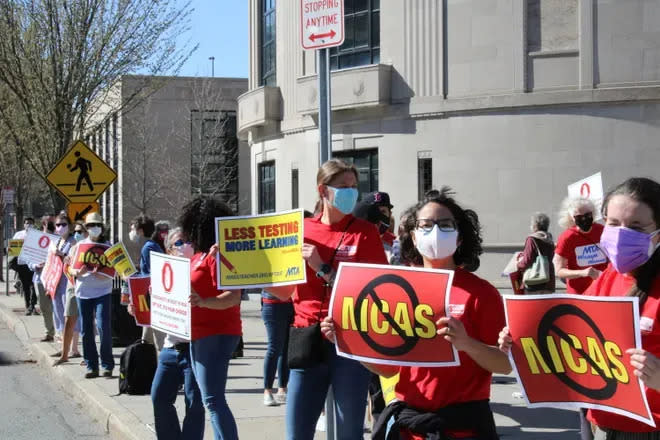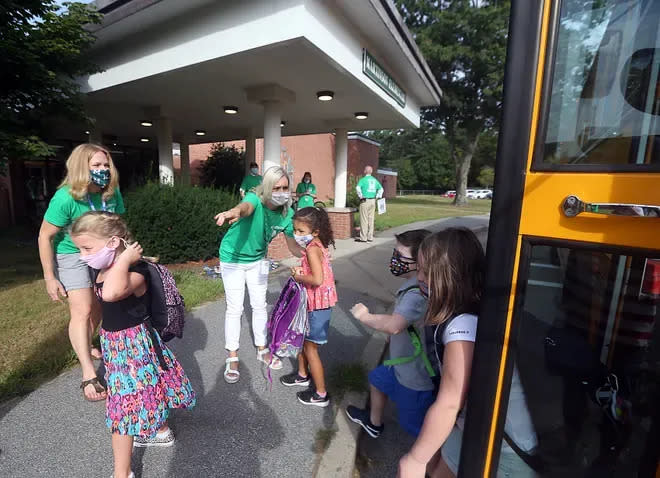With MCAS on November's ballots, educators proposing new tests to assess students
BOSTON — Opponents of using the Massachusetts Comprehensive Assessment System test as a high school graduation requirement suggest there are better ways to measure student achievement, should voters get an opportunity remove the requirement at the ballot in November.
In September, state Attorney General Andrea Campbell ruled the proposed 2024 ballot question to remove the MCAS graduation requirement for high school students was legally sound.
The question, strongly supported by the Massachusetts Teachers Association, would only remove the requirement, which has been in place since 2003; students would still have to take the exam. Lawmakers could approve the change or question backers would need to collect additional signatures to place it on the ballot.

'Long-standing objections': Cambridge educators rally against MCAS, say students may opt out
Test supporters, particularly in the business community, acknowledge the exam “while in need of targeted revisions, is the primary means for providing students, families, educators and policymakers with the objective, valid, reliable, comparable information essential to determining gaps in outcomes, preparedness for college and career success, and where additional resources are most needed — especially for those who have been and continue to be systemically marginalized: students of color, those with disabilities, English learners and students from low-income families.”
The Massachusetts Department of Education, which oversees the testing, says: “MCAS has been upgraded to better measure the critical skills students need for success in the 21st century: deeper understanding; knowledge application; synthesizing; and writing. Most students will take the test on a computer reflecting the digital world we live in today. MCAS helps the commonwealth identify schools and districts that need additional support.”
Some scholars criticize MCAS for not providing educational value
But many scholars criticize the test, arguing it provides students with no educational value and should be eliminated altogether. They recommend assessments that test how students apply what they learn in the classroom.
Lifelong educators like Harry Feder, executive director of Fair Test, which supports the implementation of “multiple, nonbiased measures of student achievement,” said MCAS tests memorization skills and knowledge of formulas rather than critical thinking and real-world skills. He said teachers often have to stray from their curriculum when preparing students to take the MCAS.

“There's a lot of complaints about … the issue of the narrowing of curriculum," said Feder. "What does MCAS actually test?”
He also cited the widely researched “disproportionate discriminatory impact” that MCAS has on students of color and low-income students.
Jack Schneider, author of “Beyond the Test Scores: A Better Way to Measure School Quality” and professor of education at UMass Amherst, said another major issue with the MCAS is that it takes away from physical time in the classroom and contributes to chronic absenteeism.
'Not a one-and-done thing': Framingham, D-S school districts flagged for MCAS improvements
“We know right now that standardized testing is really disruptive," Schneider said. "There are ways of minimizing that disruption. For instance, we don't need to test every single student in grades 3-8 as well as 10th grade every single year in order to get basically the same information.”
Beyond that, MCAS has a history of controversial questions. In 2019, students and teachers advocated for the removal of a question that asked students to “write from the perspective of an ‘openly racist’ character in the novel ‘The Underground Railroad,’” according to WBUR.
At the time, MTA President Merrie Najimy said all tests taken that included the question should be nullified because it was likely that its offensive nature affected students’ test results.
Was the MCAS inspired by a report containing 'bad data'?
Mary Battenfeld, clinical professor of American Studies at Boston University with a focus on contemporary education policy and parent advocacy, said that many of the problems with MCAS can be traced to the Education Reform Act of 1993.
The bill aimed to improve “accountability” on behalf of schools, a response to widespread panic at the release of a report called “A Nation at Risk,” which suggested that U.S. education was suffering because SAT scores were decreasing.
But Battenfeld said that “A Nation at Risk,” which led to the implementation of “accountability testing,” was “based on bad data.”
'Still not closing gaps': Should students have a say on educational policy?
As schools throughout the state continued to desegregate in the 1960s, and more money was funneled into education under former President Lyndon B. Johnson, a more diverse pool of students began taking the SAT.
“The data was saying, (SAT scores are) dropping, but they actually were rising if you took into account incremental rises over time,” Battenfeld said.
She said the same flawed methods of evaluating test scores are used today. For example, when the MCAS was administered for the first time following the COVID-19 pandemic, WBUR reported that 2022 scores were “less-than-reassuring,” indicating a “slow and mixed recovery.”
However, Battenfeld said these statistics made sense from a holistic perspective, considering pandemic-incited learning loss.
“If you're only looking at the end line of what the score is… you're not looking at improvement,” she said.
Alternative ranking methods
While some MCAS supporters argue that it's a crucial tool to rank schools, and has helped Massachusetts reach its high national ranking in education, Schneider said that's not the case.
Companies such as Niche and U.S. News & World Report, which are known for ranking schools, “are completely blind to what is happening inside schools, making their rankings essentially meaningless,” he said.
“Everybody knows at this point, that if you just are looking at proficiency rates on standardized tests, you're not learning about school quality,” Schneider said. “(What) you're learning about is the affluence of the community.”
U.S. News and World Report writes that it uses six indicators when ranking high schools — college readiness, college curriculum breadth, state assessment proficiency, state assessment performance, underserved student performance and graduation rate — though not all indicators are equally valued. Schools are then given a cumulative score between 1 and 100, and ranked accordingly.

“These aren’t ratings of school quality, these are ratings of privilege and disadvantage,” Schneider said.
Though some MCAS supporters argue that the test is necessary to rank Massachusetts on a national level, Schneider said The Nation’s Report Card, an annual report from the National Assessment of Educational Progress, already does that.
NAEP uses matrix testing, in which it randomly samples students from a variety of grades and schools to measure the state’s progress, a method that significantly reduces classroom disruption, Schneider said.
Citizens for Public Schools reports that the idea that accountability through MCAS is what previously allowed the state to rise in national ranking is false.
“Massachusetts was long at or near the top on the longstanding national test known as NAEP, before the MCAS and state standards came along,” officials from the Brookline-based nonprofit wrote. “This was mostly because we have a relatively affluent and educated state, two things that are closely linked to test results.”
'Classroom embedded assessments' have been created
According to Schneider, who leads sister organizations Massachusetts Consortium for Innovative Education Assessment and the Education Commonwealth project, alternative methods of testing are already in the works. Together, these organizations have built guidelines to what they call “classroom embedded assessments,” which would test students’ ability to apply what they learn in the classroom.
Schneider hopes that through assigned application projects, evaluated by teachers, students will be able to feel the value of their work.
“If you ask any students in the Commonwealth of Massachusetts, right after they take MCAS, what they felt the value of that was, you have a very high likelihood that you are going to hear a student say, ‘I didn't see any value in that,’” he said.
A crucial goal of classroom embedded assessment, according to Schneider, is its ability to provide teachers with valuable feedback on what worked and what didn’t in the classroom.
“Sometimes, people will make the case that what we learn from standardized assessments helps school leaders and educators adjust their practice. And that just simply isn't true,” he said. “The information just isn't timely enough, and isn't granular enough to really be valuable for the purpose of informing instruction.”
MCIEA and the Education Commonwealth Project have created free, widely available tools for educators to use when incorporating classroom embedded assignments. Teachers are encouraged to measure the efficacy of assigned projects through six different standards: alignment, rigor, equity, authenticity, agency and accessibility.
Feder said he has already seen some school districts in the commonwealth adopt innovative testing methods.
“I think there are at least eight districts around the state that do (performance-based assessments) at all levels of schools, so not just high school," he said. "And those are both sort of summative assessments, and formative assessments. So there is a lot of work that's being done on this front.”
Schneider said adopting innovative testing methods throughout the state is “well within the realm of possibility.”
“I think we have demonstrated that it's possible to do this now if you want to do it,” he said. “You would need the state to take this seriously and to use the resources that the state has at its disposal.”
This article originally appeared on MetroWest Daily News: MCAS replacement ideas proposed could better assess what's taught

